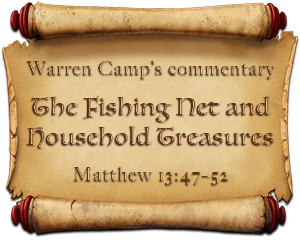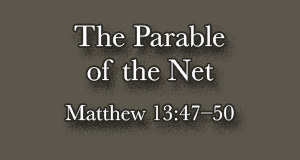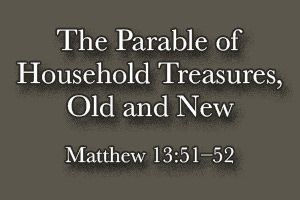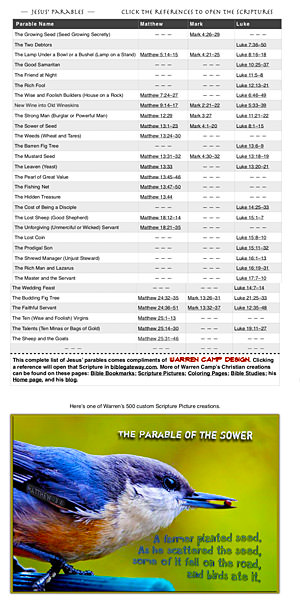
God’s kingdom of heaven casts a net out into the sea, just as fisherman do; edible and inedible fish are drawn in. Heaven also pulls in both good and evil people who’ll eventually be sorted out on judgment day. The bad and wicked will be discarded.
The second parable’s householder owned new and old treasure that had great value. The “old” treasure referred to his understanding of the law. The “new” treasure would be his understanding and application of the kingdom of heaven.

† Find Warren’s short summary at the bottom of page.

and


Click the list or the “bird” to enlarge and use Warren’s list of forty-four of Jesus’ parables (a PDF file with links to Scriptures).
Start Reading Warren’s Commentary . . .
Find his summary at the bottom.
par•a•ble [noun] a simple story used to illustrate the meaning of or a moral or spiritual lesson, as told by Jesus in the gospels
synonyms: allegory, moral story/tale, fable
The Fishing Net and Household Treasures Parables
Matthew 13:47–52
Eight back-to-back parables of Jesus are presented in chapter 13 of Matthew’s gospel. All focus on the kingdom of God. These two small parables are parables number 7 and 8. You can read Warren’s summaries of each on these “kingdom parables” pages: the Sower, Seed, and Soil; the Weeds; the Mustard Seed and the Yeast; the Hidden Treasure and the Pearl.
› The Parable of the Fishing Net or Dragnet, unique to the gospel of Matthew, reveals that a day of judgment is coming when God will separate good from evil. The evil will be judged, found guilty, and, after separation from the good, thrown into something like a fiery furnace. Thus, when the judgment books are opened, only one factor will determine one’s eternal destiny: whether the person’s name is recorded in the Lamb’s Book of Life.
› The Parable of the Household Treasures presupposes that its readers have become, through their study of the Word, scribes who are conversant with Scripture and able to teach the law. Those of us today who are disciples of Jesus and qualify to be scribes have a double treasure to draw upon, namely the old covenant prophesies and the firsthand account of learning how Jesus fulfilled them.
The Parable of the Fishing Net or Dragnet
While Matthew’s account in chapter 13 starts with Jesus telling large crowds his first four of eight parables, Jesus soon left the multitudes and met privately with his disciples inside a house where he told them the Parables of the Weeds, Hidden Treasure, and the Pearl. In each, he highlighted what the kingdom of God is like. After stating the principle of the Pearl Parable, he immediately began to relate to them his Dragnet Parable, which concludes his kingdom parables series.
Jesus prefaces this parable by saying (v. 47) that it illustrates an aspect of the kingdom of heaven. This story concerns fishermen who were familiar with the common fishing method of using a dragnet to catch fish to be eaten and sold. It was a technique in Jesus’ day to use a dragnet, which was a weighted net that was dragged along the bottom of a lake, bay, or sea, in order to effectively catch quantities of assorted fish types. Jesus’ listeners were very familiar with dragnet fishing and appreciated the applicability of what he told them.
The Parable of the Net
47“Once again, the kingdom of heaven is like a net that was let down into the lake and caught all kinds of fish. 48When it was full, the fishermen pulled it up on the shore. Then they sat down and collected the good fish in baskets, but threw the bad away. 49This is how it will be at the end of the age. The angels will come and separate the wicked from the righteous 50and throw them into the blazing furnace, where there will be weeping and gnashing of teeth.” (Matt. 13:47–50).
The kingdom of God, which Matthew often refers to as “the kingdom of heaven,” is not a place. It’s a way of thinking, believing, and acting. In this parable, a dragnet was cast into the sea and subsequently pulled onto shore; often the net was full of varieties of fish. Once the filled dragnet was dragged ashore, the fishermen would sit down and sort the fish into “good” and “bad” collections. Those fish worth keeping were gathered into containers for subsequent distribution, while the valueless fish were thrown away.
No matter how we respond to the Parables of the Hidden Treasure and the Pearl of Great Value (both linked above), Jesus remains King. And his kingdom is alive and present today, as it’s been for all time. The kingdom of God is the only kingdom into which we don’t have to fight to gain entrance. There’s no admission test or fee. In the end, King Jesus will have the final say on everything, and that ought to be okay with us. That’s the purpose of the Parable of the Net. Jesus was telling his listening disciples that even if you don’t choose to be a part of Jesus’ kingdom of heaven, you’re still going to be gathered or collected at the end. It’ll be on that final day, the day of judgment, that you’ll want to be deemed a “good” catch, not a “bad” one.
Jesus interprets this parable to his disciples in vv. 49–50 (shown above). It reminds us of the Parable of the Weeds, where the weeds are allowed to grow up with the wheat. However, at the time of harvest, there will be final sorting of “good” and “bad.” In context, Jesus is warning us not to miss receiving the joy of the kingdom right now. We don’t know when Jesus the Fisherman will drop his net upon us and drag us to him. The time to ensure that we’ll be found in good standing by him is today. “He who has ears, let him hear.” When you review the highlights of the preceding Weeds Parable (13:36–43), you’re sure to see how both parables concern an end-times sorting, which will be aided by angels, when believers will be separated from unbelievers once and for all.
Consider these two preceding parables: the Hidden Treasure and Pearl of Great Value. How did each man receive his treasure? Of the two found treasures, one found it by surprise and one discovered it after searching for it. For the two found treasures, neither was a “good luck” find; otherwise, why didn’t all who passed by the field or ran the pearl through their hands not notice the great value? Something else was in play for each man: Not only were their treasures placed before their eyes, they were also enabled with the awareness to see it. Having used Jesus’s phrase — ears to hear — they heard and responded most appropriately.
Conclusion The Parable of the Dragnet, then, reinforces the spiritual truths taught in the Parable of the Weeds, especially those relating to the coming judgment and condemnation of the wicked. That Jesus would emphasize the judgment and condemnation of the wicked in this parable ought to impress upon us that the “good news” of the kingdom of heaven also contains “bad news” for those who reject his kingdom.
Just as the net that had been cast into the water had collected many fish, the Lord’s gospel message has similarly been cast into the world, dragging and drawing many people to it. And, as the video clip below highlights, just as the net gathered all types of fish, regardless of their value, so the gospel attracts many people who neither repent nor desire to follow Christ. Finally, just as the fish couldn’t be sorted until the net was pulled ashore, those false believers masquerading as true Christians won’t be “kept” or “discarded” until the end of the age.
Considering this chapter’s previous parables, these “bad fish” or false believers, can be likened to the rocky soil and the thorny soil in 13:5–7, and to the weeds/tares in v. 40. They claim to have a relationship with Jesus, when they cry out, “Lord, Lord” (7:21–23). But Jesus’ reply will be “I never knew you. Away from me, you evildoers!” (v. 23)
The sobering main point of the parable can be stated thus: “A day of reckoning will come in which God will separate the true believers from mere pretenders, and those found to be false will be cast into hell” (Robert Gobelet: “Questions and Answers from the Bible”).
This 2-minute video highlights Jesus' teaching of the 'Parable of the Fishing Net,' compliments of 'The Chosen.'
The Parable of Household Treasures, Old and New
Somewhat as a conclusion to the eight Matthew 13 parables that Jesus told the crowds and his disciples, this final miniparable toward the end of that chapter summarizes his kingdom parables collection. It’s his Parable of Household Treasures (or the Master of the Household).
As a household master or homeowner graces his banquet with things already in his house and with other things he’s acquired, so a religious teacher must refresh his listening students using his past and present experiences and lessons.
51“Have you understood all these things?” Jesus asked.
“Yes,” they replied.
52He said to them, “Therefore every teacher of the law who has become a disciple in the kingdom of heaven is like the owner of a house who brings out of his storeroom new treasures as well as old” (vv. 51–52).
Following his explanation of The Parable of the Dragnet (above, vv. 47–50), we find Jesus asking his disciples if they understood all of what he’d told them about his kingdom. This question not only relates to this kingdom miniparable but to all of what he’d said that Matthew recorded in this chapter, as shown in these parables: the Sower, Seed and Soil; the Weeds; the Mustard Seed; the Leaven; the Hidden Treasure; the Pearl; the Dragnet — all of which reveal truths related to "the mysteries of the kingdom of heaven" (13:10–11).
We see in v. 51 that Jesus asked his disciples, “Have you understood all these things?” When they responded with “Yes,” Jesus reminded them of what he’d said, again and again, about the kingdom of heaven (v. 52). Although his phrase “new treasures as well as old” is likely unfamiliar to the majority of today’s readers, his audience would have understood it to convey the concept of having plenty. As such, the idea of “the owner of a house who brings out of his storeroom new treasures as well as old” suggests a well-supplied master of the house.
Further, at the start of v. 52, because Jesus compares the well-endowed homeowner to a teacher of the law or scribe who’s been trained in understanding and applying the Word of God, the referred-to “treasures” would be knowledge and understanding of God’s kingdom. Jesus was telling his disciples then (and us today) that those who study and know God’s Word are richly endowed with the treasures of God’s kingdom. It’s they and us who’ve been instructed concerning the value and benefit of the kingdom of heaven.
When Jesus refers to “teachers of the law” (or “scribes” in some versions), we should appreciate its meaning. The “Holman Bible Dictionary” defines a scribe as “a person trained in writing skills and used to record events and decisions.” Scribes were more than simply historians and copyists; they were also students and instructors. Jesus wasn’t referring to a scribe or teacher of the law who’d simply understood the law, but was instead referring to one who’d have the giftedness and devotion to instruct students on the kingdom of heaven through the knowledge of the kingdom and successful presentations of Jesus’ insightful parables.
New and old treasures? This parable’s household master owned both “new” and “old” “treasures” that had great value. The “old” treasure referred to his understanding of the law. The “new” treasure would be his understanding and application of the kingdom of heaven.
The implications In my opinion, and as the video clip below documents, Jesus is likely making at least three suggestions in this miniparable. Every disciple is to: (1) act like a scribe or teacher of the law; (2) become a homeowner with a collection of valuable treasures; and (3) effectively utilize both the old and the new treasures in our kingdom presentations to many.
Conclusion Only when we, as disciples of Christ, understand his intuitive parables and his other teachings concerning the kingdom of heaven, as documented in the Old and New Testaments, will we receive treasure upon treasure for us to use effectively to further his kingdom. But, for us to be effective disciples today, we must devotedly replicate the actions of “the scribes of old” so that we and those whom we teach will fully appreciate and enjoy the bounty of treasures that God has made available to us.
Suggestion Make a hearty effort to become a wise steward! Please don’t allow this world’s distractions to cause God’s “treasures” that are in your possession to slip through your fingers!
This video clip comes compliments of 119Ministries.
“This is how it will be at the end of the age. The angels will come and separate the wicked from the righteous . . .” (Matt. 13:49)

Take our “Parables Quiz.”
See Warren’s other “Parables of Jesus” commentaries.
— Warren’s Concise Summary —
The Parable of the Fishing Net pictures God’s kingdom like a dragnet that gathers fish of every kind, which are later sorted so the good are kept and the bad discarded, illustrating that all people are drawn in but finally separated at the end of the age when the righteous are welcomed and the wicked are rejected in judgment.
The Parable of Household Treasures then likens a trained disciple of the kingdom to a householder who brings out treasures both new and old, showing that those taught by Jesus draw on both prior revelation (such as the Hebrew Scriptures) and the fresh insights of his kingdom message, valuing and using them together in service of God’s rule.
